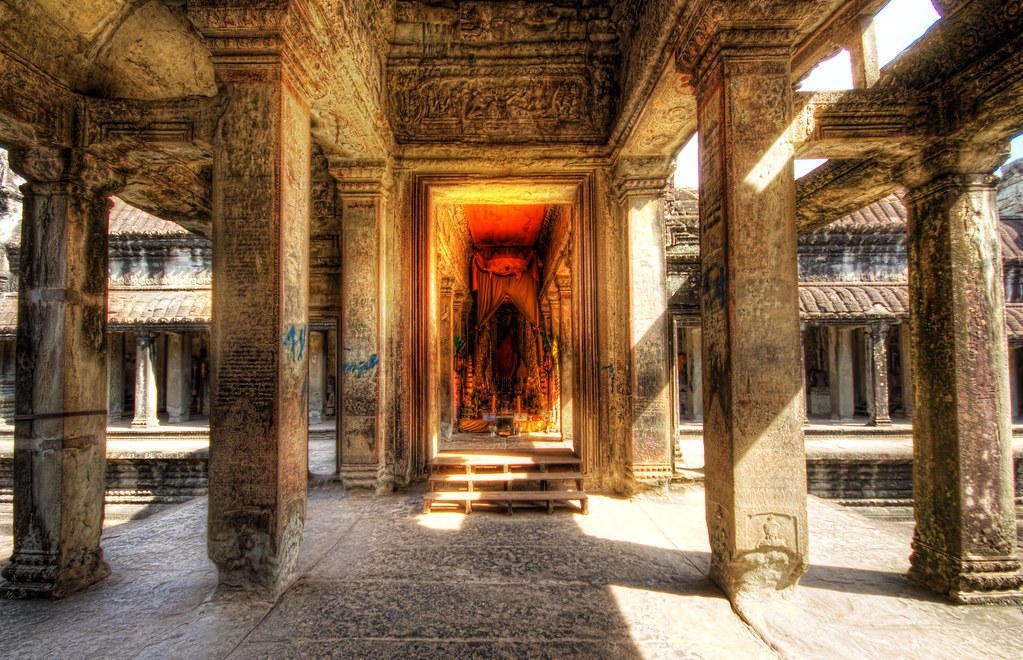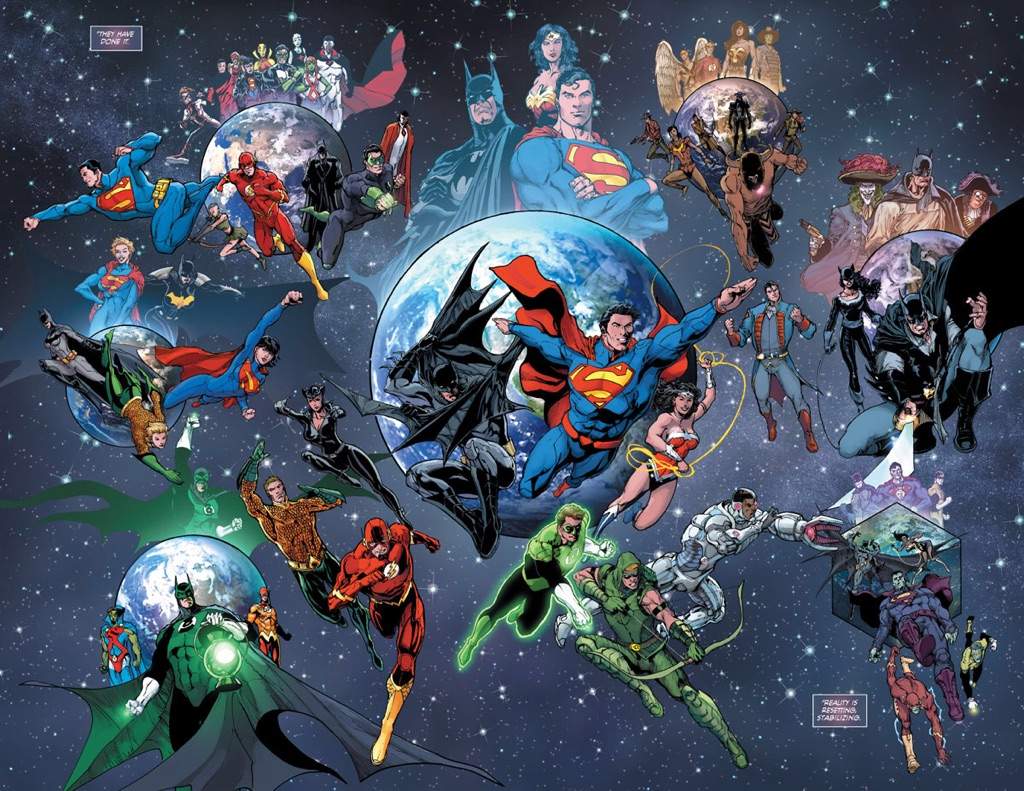The Marvel Multiverse is a complex collection of alternate universes, branching off as the different outcomes of events into multiple different realities. DC Comics has its own version of the multiverse and there are tons of television shows, movies, and books that explore the consequences of reality being made up of multiple branching universes.
What’s insane is that a lot of scientists and physicists actually believe some sort of real-life Multiverse exists. The existence of a multiverse would help explain a lot of complicated issues related to quantum physics, string theory, and the fine tuning of the universe.
The Multiverse is also posited as a naturalistic, materialistic, and atheist response to the belief in God the Creator. If a vast Multiverse of worlds exists then there’s no need for God as the source of creation. Instead, everything that can happen does happen, and we’re just lucky enough to live in the particular corner of the Multiverse that allows humans to flourish.
In my previous post on God vs the Multiverse, I went through three rounds of arguments against God and showed that all of them could also be levied against the Multiverse. In this post, I’ll take a look at three more arguments against God and show how they’re also arguments against the Multiverse.
Ready?
Ok.
LET’S GET READY to RUUUUUUUMBLE!

Round Four: Who Created God?
Whenever a theist posits God as the ultimate source of creation, atheists and agnostics tend to ask the admittedly necessary question: “Well what created God?”
This is known as The Problem of the Creator of God. Theists have various responses, such as viewing God as the ultimate First Cause and therefore without His/Her own cause. They’ll also say that the reality of causation only makes sense for created contingent things, and since God is not a created thing, the very premise of the question is incorrect. It’s like asking what’s north of the North Pole. Another similar response is for theists to state that as the creator of time and space itself, God exists outside of time and space and therefore is not bound by the causal rules of things within time and space. A final possible answer could be the idea of infinite regress where God was created by another god, who was in turn created by another god, ad infinitum. Some religions such as Mormonism seem to suggest such an infinite regress of gods in their theology.
In the end, however, any honest theist will admit that this is a thorny problem without any cut and dry answers.
The same holds true for the Multiverse.
Similar to God, if one posits the Multiverse as the ultimate cause of creation, the natural followup question is also “Well what created the Multiverse?”
What’s fascinating is that physicists give responses that are very similar to the ones theists offer for God. One answer is that the question doesn’t make sense. Since the Multiverse exists in a dimension outside of space and time–is in fact the origin of space and time–then the entire basis of the question is false. It’s like asking what’s north of the North Pole?
Sound familiar?
Another response involves an infinite regress of causal universes, where this current universe arose from a previous universe, ad infinitum, in an eternal linear or cyclical unfolding. Again, this is very similar to some theological conceptions of God.
Ultimately, since the arguments and responses for what created God and the Multiverse are so similar, neither makes more or less logical sense.
Round 4 Results:
God: 0
Multiverse: 0
Round Five: Free Will
Another thorny issue that atheists or agnostics raise with theists is the issue of free well.
If God is all-knowing, then God knows everything humans will do before they do it. So how can humans have free will? And if God is all-powerful, then human free will can’t exist because that would limit God’s power.
This is known as The Argument from Free Will and places theists in an apparent bind. Either God is not all-knowing and all-powerful or humans do not have free will.
Interestingly enough, a similar “free will” argument can be made against the Multiverse.
If our universe is a random bubble in a sea of bubble universes all defined by strict materialistic laws, then all of us humans are mere puppets following a set of actions preordained since infinity by the laws of physics. We’re just another set of determined causes and effects in an infinite chain of cause and effect. In such a scenario, how is human free will possible?
The obvious answer, for both theists and proponents of the multiverse, is that humans do not have free will. Whether or not this response sits well with you depends on your own thoughts and feelings towards the question of free will.
It’s clear, however, both the concepts of God and the Multiverse raise difficult to resolve issues around the existence of consciousness and free will.
And neither offer clear-cut answers.
Round 5 Results:
God: 0
Multiverse: 0

Round 6: The Problem of Evil (and Good)
Now we come to what some consider the greatest argument against the existence of God, The Problem of Evil. The question can be posed like this: “If God is both Good and All-Powerful then how is there so much evil in the world?”
This one has been argued about by atheists and theists for centuries. Many solutions have been offered, the most important being the existence of human free will as the true source of evil. Since God does not want to limit human free will she/he necessarily can’t limit evil either. Despite such responses, however, every believer in their most honest moments would admit The Problem of Evil is a difficult issue to completely resolve.
So that’s it right?
The multiverse has finally won a round!
Not so fast.
A somewhat similar issue can be raised with the Multiverse, but in reverse. This issue is “The Problem of Good”.
It goes like this.
In the parameter space of all possible universes there are a lot more terrible universes than good ones. This is similar to the “fine-tuning” argument. Here however, instead of discussing how fine-tuned the conditions for the existence of life are, we’re taking it a step further and saying the conditions for the existence of a “good life” are even more fine-tuned.
In all possible universes that can support life, the number of universes that are as good, happy, and beautiful as ours are much less than the number of universes that are terrible places to live (read any speculative fiction story and you’ll see what I mean). So what are the chances that in the infinite lottery of universes we just happen to live on such an awesome planet?
Extremely low to say the least.
Round 6 Results:
God: 0
Multiverse: 0
Conclusion:
It’s fascinating how similar the arguments for and against God and the Multiverse are.
After going through six of these arguments it’s easy to see why. God and the Multiverse have very similar characteristics. They both:
- Are eternal, all-powerful, universe making entities
- Exist outside of time and space
- Are the source of the laws of physics
- Are the ultimate cause of the universe we currently live in
- Can’t be proved or disproved using the scientific method
These two concepts are so similar that proponents of the Multiverse even accuse scientists of being biased when they protest the idea of a Multiverse as untestable and unfalsifiable. For example, science writer Tom Siegfried, exclaims that multiverse skeptics are themselves unscientific, because they are “pre-supposing a definition of science that rules out multiverses to begin with.” This is almost word for word what some theists say of scientists who deny the existence of God.
In the end, the crucial difference between God and the Multiverse is that one presupposes some kind of intelligence or purpose behind creation while the other presupposes pure chance and probability.
Given that the arguments for and against God or the Multiverse are fairly evenly matched, it’s perfectly logical to choose whichever best fits your own understanding of the world.
No one has a monopoly on truth when it comes to such deep questions as the ultimate cause and source of existence.
So choose the one that speaks most to you but leave the door open to possibilities greater than our minds can hold.
In the end, we all worship at the same alter of Truth.


